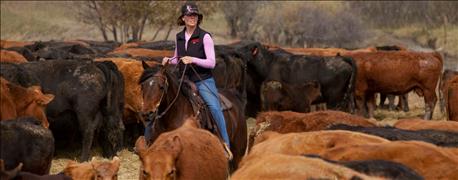February 28, 2016

Erika Kenner is on a mission to make Kenner Simmental a leading source of Simmental and SimAngus beef genetics in the Northern Plains.
Kenner works with her parents, Roger and Jeannette, near Leeds, N.D., on a ranch founded by her grandfather, Alvin. She returned to the family business in 2007 after attending North Dakota State University and working for four years with American Simmental Association the Register in Bozeman, Mont.
Kenner bought her first Simmental cow when she was 10-years-old and had a well-established herd by the time she graduated from high school. She credits her ambitious plans to her parents’ attitude that there were no limits to what woman could to do.

Erika Kenner checks cows and calves on the Kenner Simmental ranch near Leeds, N.D.
Kenner encourages other young women to consider farming and ranching as a career.
“Don’t be afraid to … jump in and do it,” she says.
Not surprisingly, Kenner, who is the third generation on her family’s farm, also enjoys the excitement – and challenges – of grain farming and raising purebred Simmental cattle. The Leeds, N.D., native bought her first Simmental cow at the age of 10 and had a well-established herd by the time she was in high school. She also began renting farmland as a high school freshman.
Kenner left the farm for a time. She attended North Dakota State University and worked with the American Simmental Association in Bozeman, Mont., for four years. But a conversation with her dad about expanding their registered Simmental cattle herd prompted her to return home in 2007.
“Returning to the farm was always my goal,” says Kenner, 36. The family farm was started by her paternal grandfather, Alvin. Her parents, Roger and Jeanette, added Simmental cattle to the operation in 1974. They have sold bulls for 38 years and held their first production sale in 1996.
Erika is the oldest of three children, including brother, Brett, 24, who works as a hunting and fishing guide; and sister Jessica Dalziel, 32, who is married with a family and operates a flower shop in Devils Lake.
Opportunity to expand
Since Erika’s return, the Kenners have grown their cowherd from 250 to 400 head, which has allowed them to increase the number of Simmental and SimAngus bulls offered at their annual production sale in February. Grain farming is also part of the operation with Erika owning some of her own land and several pieces of equipment and working in conjunction with her father.
She notes that her parents are only in their mid-60s and not ready to retire. But with Erika coming back into the operation, her dad has been able to take some extended hunting trips and they are preparing for the eventual transition of the operation to the next generation.
Currently, Erika and herdsman Bryan Leapaldt oversee most of the cattle management, while Roger handles more of the farming.
Most recently, Erika has focused on adding efficiencies to their cattle herd. They have built a new bull and heifer development center which includes a facility to host their bull sale at the ranch starting in 2015. Prior to this, Erika says they had cattle housed about five miles apart, which meant AI breeding and feeding at two different places, increasing labor and costs.
They are also working to do more synchronized breeding and have added biosecurity measures – including testing for Johnes and BVD – within their herd. “As a seedstock supplier we want to be sure we are not creating health problems in our customer’s herds,” Kenner says.
Regarding genetics, she says they strive to “make better matings every year.” They keep balanced selection with calving ease, performance and carcass traits in mind to best serve the herd needs of their commercial cattle customers. Their annual sale offering includes both black and red genetics of purebred Simmental and SimAngus bulls.
For the future, Kenner says they’ve reached the maximum number of cows they can calve in their facility. To grow, she says they are looking at working with cooperator herds using embryo transfer. They currently have one such arrangement in place.
Ultimately, Kenner’s goal is to keep their family operation offering quality Simmental cattle for many years to come. Her commitment to the breed includes running for the American Simmental Association board of directors and being elected to a three-year term in 2014. Her father served on the board from 1997 to 2002 – including a year as chairman in 2001.
Kenner also serves the breed as editor and ad manager for the North Dakota and South Dakota Simmental publication which is published three times a year.
After attending the Young Cattlemen’s Conference hosted by NCBA in 2012, Kenner recognizes the importance of membership and involvement in industry associations as well. She says, “I have always been involved in our breed association, but I realized that what the North Dakota Stockmen’s and NCBA do for the total beef industry issues is very valuable.”
To other young people – especially women – looking at opportunities in production agriculture, Kenner notes at times it’s not easy and “you have to have a thick skin.” Despite that she says, “Don’t be afraid to ask questions and jump in and do it.”
Gordon writes from Whitewood, S.D.
You May Also Like




